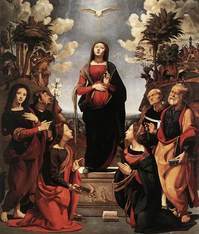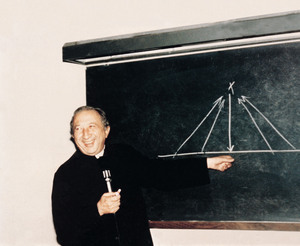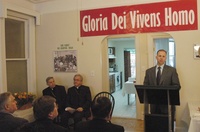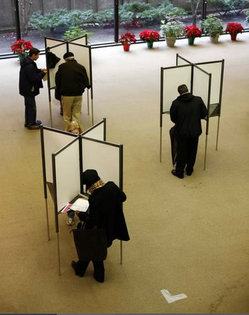I am frequently asked what is Communion & Liberation. Well, an answer is the following:
"A charism," Fr. Giussani has written, "can be defined as a gift of the Spirit, given to a person in a specific historical context, so that this person can initiate an experience of faith that might in some way be useful to the life of the Church. I emphasize the existential nature of charism: it makes the Christian message handed down by the apostolic tradition more convincing, more persuasive, more 'approachable.' A charism is an ultimate terminal of the Incarnation, that is, it is a particular way in which the Fact of Jesus Christ Man and God reaches me, and through me can reach others."
The essence of the charism given to Communion and Liberation
can be signaled by three factors:
1. The announcement that God became man (the wonder, the reasonableness, the
 enthusiasm for this): "The Word was made flesh and dwells among us."
enthusiasm for this): "The Word was made flesh and dwells among us."
2. The affirmation that this man - Jesus of Nazareth dead and risen - is a present event in a "sign" of "communion," i.e., of unity of a people guided, as a guarantee, by a living person, ultimately the Bishop of Rome;
3. Only in God made man, man, therefore only in His presence and, thus only through - in some way - the experienceable form of His presence (therefore, ultimately only within the life of the Church) can man be truer and mankind be truly more human. St Gregory Nazianzen writes, "If I were not Yours, my Christ, I would feel like a finished creature". It is thus from His presence that both morality and the passion for the salvation of man (which is mission) spring up.
 "From the first hour of class at the Berchet high school in Milan," Fr. Giussani recalls, "I tried to show the students what moved me: not the wish to convince them that I was right, but the desire to show them the reasonableness of faith; that is, that their free adhesion to the Christian proclamation was demanded by their discovery of the correspondence of what I was saying with the needs of their hearts, as implied by the definition of reasonableness. Only this dynamic of recognition makes whoever adheres to our movement creative and a protagonist, and not simply one who repeats formulas and things they have heard. For this reason, it seems to me, a charism generates a social phenomenon not as something planned, but as a movement of persons who have been changed by an encounter, who tentatively make the world, the environment, and the circumstances that they encounter more human. The memory of Christ when it is lived tends inevitably to generate a presence in society, above and beyond any planned result."
"From the first hour of class at the Berchet high school in Milan," Fr. Giussani recalls, "I tried to show the students what moved me: not the wish to convince them that I was right, but the desire to show them the reasonableness of faith; that is, that their free adhesion to the Christian proclamation was demanded by their discovery of the correspondence of what I was saying with the needs of their hearts, as implied by the definition of reasonableness. Only this dynamic of recognition makes whoever adheres to our movement creative and a protagonist, and not simply one who repeats formulas and things they have heard. For this reason, it seems to me, a charism generates a social phenomenon not as something planned, but as a movement of persons who have been changed by an encounter, who tentatively make the world, the environment, and the circumstances that they encounter more human. The memory of Christ when it is lived tends inevitably to generate a presence in society, above and beyond any planned result."
 Saturday, October 25 at 2 PM at Holy Family Church, East 47th Street in Manhattan.
Saturday, October 25 at 2 PM at Holy Family Church, East 47th Street in Manhattan. Communion & Liberation (CL) describes its purpose as "the education to Christian maturity of its adherents and collaboration in the mission of the Church in all the spheres of contemporary life." It aims to communicate the awareness that Christ is the one true response to the deepest needs of people in every moment of history. CL says that it requires only that Christ be recognized as immediately present. The person who encounters and welcomes the presence of Christ undergoes a conversion that affects not only the individual but also the surrounding environment.
Communion & Liberation (CL) describes its purpose as "the education to Christian maturity of its adherents and collaboration in the mission of the Church in all the spheres of contemporary life." It aims to communicate the awareness that Christ is the one true response to the deepest needs of people in every moment of history. CL says that it requires only that Christ be recognized as immediately present. The person who encounters and welcomes the presence of Christ undergoes a conversion that affects not only the individual but also the surrounding environment.




